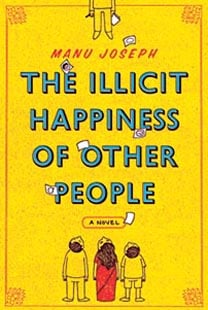 Men don’t fare well in The Illicit Happiness of Other People, Manu Joseph’s biting novel set in Tamil South India. They are sometimes boozy, often lazy and always lecherous beasts who inflict corporal punishment on their own children when they aren’t busy leering or pawing at others. This unseemly aspect of contemporary Indian society is familiar to anyone who follows the news—recall the gang rape of a 23-year-old woman late last year, among other horrors—and Illicit lays bare the consequences of this all-too-casual brutality. Ousep Chacko is an alcoholic journalist who makes it his life’s mission to figure out why his eldest son, Unni, a handsome misfit who draws cartoons and spouts endearing philosophical oddities, decided to end his life by jumping off the balcony of the family home. A mail delivery of some of Unni’s cartoons three years after his death reignites the pursuit, yet it is hobbled by the secrets about Unni that Ousep and his wife, Mariamma, keep from each other. This couple, former socialists who don’t share a bed, are beyond dysfunction: Ousep constantly threatens to kill himself if only to put an end to his marital misery, while Mariamma is sad only because she knows he’ll never actually go through with it. He drinks and smokes; she babbles angrily at walls and strangers, still tortured by a decades-old sexual assault. In the middle is Thoma, Unni’s confidence-free younger brother, who is in love with Mythili, their next-door neighbour and the last person to see Unni alive. Unni’s suicide, Ousep knows in his heart, isn’t a simple case of teenage melancholy gone awry. The father finds an answer by searching out his dead son’s many incarnations: the playful, cunning sadist; the avenging angel; the scathing caricaturist; and, yes, a boy who can’t help himself around the opposite sex, and is utterly disgusted with this fact. Visceral and at times hilarious, Illicit is an indictment of a society that has surrendered to the baser instincts of its men.
Men don’t fare well in The Illicit Happiness of Other People, Manu Joseph’s biting novel set in Tamil South India. They are sometimes boozy, often lazy and always lecherous beasts who inflict corporal punishment on their own children when they aren’t busy leering or pawing at others. This unseemly aspect of contemporary Indian society is familiar to anyone who follows the news—recall the gang rape of a 23-year-old woman late last year, among other horrors—and Illicit lays bare the consequences of this all-too-casual brutality. Ousep Chacko is an alcoholic journalist who makes it his life’s mission to figure out why his eldest son, Unni, a handsome misfit who draws cartoons and spouts endearing philosophical oddities, decided to end his life by jumping off the balcony of the family home. A mail delivery of some of Unni’s cartoons three years after his death reignites the pursuit, yet it is hobbled by the secrets about Unni that Ousep and his wife, Mariamma, keep from each other. This couple, former socialists who don’t share a bed, are beyond dysfunction: Ousep constantly threatens to kill himself if only to put an end to his marital misery, while Mariamma is sad only because she knows he’ll never actually go through with it. He drinks and smokes; she babbles angrily at walls and strangers, still tortured by a decades-old sexual assault. In the middle is Thoma, Unni’s confidence-free younger brother, who is in love with Mythili, their next-door neighbour and the last person to see Unni alive. Unni’s suicide, Ousep knows in his heart, isn’t a simple case of teenage melancholy gone awry. The father finds an answer by searching out his dead son’s many incarnations: the playful, cunning sadist; the avenging angel; the scathing caricaturist; and, yes, a boy who can’t help himself around the opposite sex, and is utterly disgusted with this fact. Visceral and at times hilarious, Illicit is an indictment of a society that has surrendered to the baser instincts of its men.
Visit the Maclean’s Bookmarked blog for news and reviews on all things literary